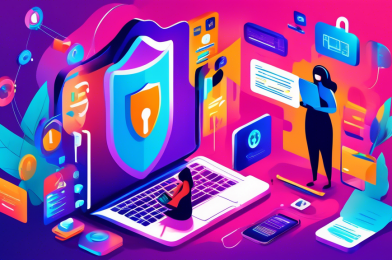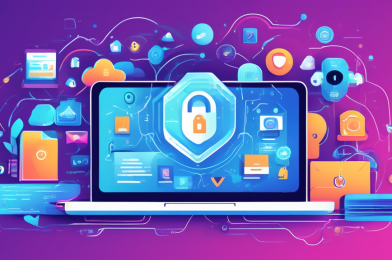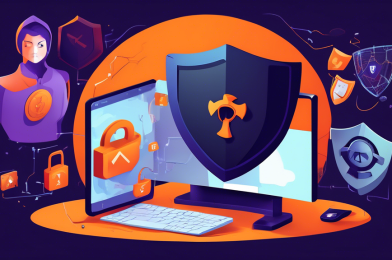Understanding the Importance of a CalOPPA Privacy Policy for Your Website
What is a CalOPPA Privacy Policy and Why Does Your Website Need One?
In today’s digital age, safeguarding user privacy is not just a choice but a legal obligation for website owners. One of the pivotal regulations governing online privacy is the California Online Privacy Protection Act, commonly known as CalOPPA. This legislation sets stringent requirements for websites that collect personal data from California residents, mandating the implementation of a comprehensive CalOPPA privacy policy.
A CalOPPA privacy policy serves as a transparent declaration of how your website collects, uses, and protects user information, ensuring compliance with state legislation. This is crucial not only for meeting legal obligations but also for fostering trust with your audience. Websites that handle user data must adhere to these guidelines to avoid legal repercussions.
Failure to comply with CalOPPA can result in significant legal implications, including financial penalties and damage to your website’s reputation. Therefore, understanding the intricacies of CalOPPA and implementing a robust privacy policy is essential for any website aiming to maintain credibility and avoid unnecessary legal challenges.
What is a CalOPPA Privacy Policy and Why Does Your Website Need One?
Understanding the California Online Privacy Protection Act (CalOPPA)
The California Online Privacy Protection Act (CalOPPA), enacted in 2003, was the first state law in the United States to mandate commercial websites and online services to conspicuously post a privacy policy. It aims to safeguard the privacy of consumers by ensuring transparency and accountability when it comes to collecting and managing personal information online. CalOPPA applies to any website that collects personal data from residents of California, regardless of the website’s base location.
CalOPPA outlines specific requirements for privacy policies, mandating that they must clearly specify:
- Categories of personal information that are being collected.
- Third parties with whom the data might be shared.
- A description of the process by which users can review and request changes to their personal information.
- A clear mention of how the website notifies users of changes to its privacy policy.
- The effective date of the privacy policy.
The Importance of Compliance
With an increasing emphasis on data privacy globally, compliance with CalOPPA is more crucial than ever for websites collecting user information. As digital interactions expand, so do concerns over how personal information is used. Consumers are more likely to trust websites that demonstrate a commitment to safeguarding their information. Complying with CalOPPA not only helps build trust with users but also positions your business as one that respects and values privacy.
For California residents, who account for a significant portion of online consumers, adherence to CalOPPA is not optional. Failure to comply can lead to not only loss of consumer trust but potentially legal repercussions, which could result in financial penalties and damage to your brand’s reputation. Given that California has one of the largest economies in the world, protecting the privacy of its residents—as required by CalOPPA—can have extensive implications for businesses not just in the United States but globally.
Legal Implications and Penalties for Non-Compliance
Non-compliance with CalOPPA can invite significant legal implications. The California Attorney General has the authority to enforce CalOPPA regulations, which can lead to substantial financial penalties for violators. Currently, the fines can amount to $2,500 per violation, and a single violation can occur each time a person in California accesses your non-compliant website.
Moreover, once notified of a violation, businesses have only 30 days to comply with the regulations. Failure to promptly address the concerns can result in continued exposure to penalties. Therefore, understanding and appropriately implementing a CalOPPA privacy policy is crucial for all businesses with an online presence targeting or inadvertently attracting California consumers. The repercussions of neglecting this compliance obligation extend beyond financial penalties, potentially leading to a loss of credibility and trust among consumers and partners alike.
In summary, a CalOPPA privacy policy is not just a legal necessity but a valuable tool in building a transparent relationship with your users. By ensuring your website is compliant, you not only adhere to the legal requirements but also promote responsible data handling practices, crucial in the current digital landscape.
Key Elements to Include in Your CalOPPA Privacy Policy
Understanding the fundamental elements that make up a robust CalOPPA privacy policy is crucial for any website operator hoping to align with legal requirements and foster trust among users. The California Online Privacy Protection Act (CalOPPA) mandates that websites clearly disclose their privacy practices. Therefore, ensuring that your privacy policy encompasses specific components is essential to achieve compliance and strengthen the credibility of your online presence.
1. Details on Data Collection
One of the primary components of a CalOPPA privacy policy is a detailed description of data collection practices. It is vital to inform users about the types of information collected, which may include personal identification details, browser specifications, and browsing behavior. Disclosing the methods employed for data collection, such as through cookies or user-provided information via forms, empowers users with clarity on what data is being gathered.
2. User Rights and Controls
Transparency in your privacy policy should extend to user rights and controls. CalOPPA requires websites to provide users with explicit insights into their rights to access, modify, or delete their personal data. Websites must clearly articulate how users can exercise these rights. Additionally, consider explaining any options available for users to limit data collection or opt out of data tracking, providing links or instructions where applicable.
3. Data Usage and Sharing Practices
A critical part of the CalOPPA privacy policy is detailing how collected data will be utilized and with whom it may be shared. Transparency regarding data usage for personalized content, marketing, or analytics builds trust. Moreover, specifying third parties with whom data may be shared, such as service providers or partners, is essential. Users should be informed if data sharing occurs for business purposes or due to legal obligations.
4. Security Measures
Users are increasingly concerned about data security. Hence, your privacy policy should outline the measures implemented to protect their information from unauthorized access or breaches. While not required to disclose technical specifics, reassuring users about encryption, firewalls, and other security protocols will enhance their confidence in safely interacting with your website.
5. Updates and Changes to the Policy
Given the dynamic nature of privacy regulations and technological advancements, your website’s privacy policy must remain adaptable. Include a section that explains how users will be informed of significant changes to the policy. Whether this is through email notifications or a visible alert on your website, providing this information ensures users are aware of their rights and any modifications affecting data handling practices.
6. Contact Information
Offering a means for users to contact your organization with questions or concerns about privacy practices is not only good practice but a requirement under CalOPPA. Supply an accessible method, such as a dedicated email address or contact form, ensuring users have an open line of communication should they need assistance or clarification regarding their privacy.
Enhancing User Trust Through Clarity and Transparency
A well-constructed CalOPPA-compliant privacy policy enhances user trust and adds credibility to your website. Clear language free from technical jargon invites users to engage with your content confidently. By prioritizing transparency and comprehensively detailing how user information is handled, you foster an environment of trustworthiness, which can significantly benefit user retention and satisfaction.
Crafting a Comprehensive CalOPPA Privacy Policy
Creating a privacy policy that effectively meets CalOPPA requirements can be achieved by utilizing templates or examples that provide structured guidance on necessary inclusions. Consider using resources available from legal advisories or consulting a privacy expert to tailor a policy specific to your website’s operations. This approach ensures that all legal bases are covered and aligns your policy with best practices for data protection and user engagement.
In summary, understanding and implementing the key elements of a CalOPPA privacy policy not only safeguards your website from potential legal repercussions but also strengthens the bond of trust with your users. Thoroughly addressing data collection, user rights, data use, and transparency can position your website as both legally compliant and user-friendly, enhancing your brand’s reputation and fostering long-term digital success.
Best Practices for Implementing and Maintaining a CalOPPA Privacy Policy
Ensuring that your website is compliant with the California Online Privacy Protection Act (CalOPPA) is not just a legal requirement but also a best practice for fostering trust with your users. By implementing and maintaining a CalOPPA privacy policy effectively, you can enhance user experience and protect your business from potential legal repercussions. In this segment, we delve into best practices for displaying, updating, and monitoring your CalOPPA privacy policy.
Effective Display of Your CalOPPA Privacy Policy
One of the foremost steps in complying with CalOPPA is making sure your privacy policy is easily accessible and visible to users. Here are some strategies to ensure you’re not only meeting legal requirements but also optimizing user engagement:
- Prominent Placement: Position your CalOPPA privacy policy link in a prominent location such as the website footer. This ensures it is visible on every page, making it easy for users to find.
- Homepage Reference: Include a direct reference or link to your privacy policy on your homepage. This can be a part of the welcome message or within the signup/registration prompts.
- Clear Labeling: Ensure the link is clearly labeled as Privacy Policy to eliminate any ambiguity for your users. A dropdown menu or a secondary content link should be avoided to reduce friction in accessing it.
Strategies for Regularly Updating Your Privacy Policy
Maintaining compliance is an ongoing process that involves regularly revisiting and updating your privacy policy to reflect any legislative changes and alterations in business practices. Here are tips to keep your policy up-to-date:
- Annual Reviews: Schedule an annual review of your privacy policy to align with any updates in CalOPPA regulations or your own data collection practices. Making this a part of your regular compliance routine ensures your policy remains relevant and compliant.
- Change Notifications: Notify users proactively whenever there are significant changes to the policy. Employ methods such as email notifications or website banners to keep users informed and enhance transparency.
- Document Versioning: Keep a log of changes to your privacy policy with version numbers and dates. This not only helps track amendments but also aids in accountability and clarity with your users.
Monitoring Compliance and Training Staff
Implementing a CalOPPA privacy policy is not a one-time task but requires continuous monitoring and staff training to ensure organizational compliance with this legislation. Consider the following strategies:
- Regular Audits: Conduct regular audits of your data practices and privacy policy implementation. This helps identify any potential gaps or areas of improvement in your compliance strategy.
- Data Handling Protocols: Develop clear protocols for how staff should handle user data in accordance with CalOPPA. Establish guidelines that emphasize the importance of data protection and privacy.
- Staff Training: Invest in regular training sessions for your staff to educate them about CalOPPA requirements and the role they play in ensuring compliance. This can significantly reduce the risk of errors that lead to non-compliance.
- Feedback Mechanism: Implement a mechanism where users or employees can report concerns or suggest improvements regarding privacy practices. This can be an essential tool in maintaining robust compliance and fostering an open, transparent environment.
By embedding these best practices into your organizational processes, you can establish a comprehensive approach to CalOPPA compliance. Not only do these strategies protect your business legally, but they also enhance your reputation as a company that values user privacy and trust. Maintaining a CalOPPA privacy policy is thus integral not just for compliance, but as a strategic advantage in today’s digital landscape.
Conclusion: The Critical Role of a CalOPPA Privacy Policy
Understanding and implementing a CalOPPA privacy policy is not just a legal obligation but a strategic move toward building a trustworthy relationship with your website users. As explored in this article, compliance with the California Online Privacy Protection Act is crucial for any entity that handles user data. Not only does it shield your business from potential legal repercussions and penalties, but it also establishes a foundation of transparency and accountability—key factors in fostering user trust.
Building Trust and Ensuring Compliance
By incorporating key elements such as clear data collection practices, detailed user rights, and transparent data-sharing information, a well-crafted CalOPPA privacy policy can significantly reinforce your website’s credibility. These elements ensure that users are well-informed and can exercise their rights effectively. Moreover, a policy that is regularly updated and easily accessible underscores your commitment to protecting user privacy and adhering to legislative requirements.
Maintaining and Enhancing Your Privacy Strategy
Adopting best practices like ensuring the visibility of your privacy policy, staying updated with legal changes, and training your staff can make a considerable difference in maintaining compliance. Continuous monitoring and adjustments to your privacy strategies are essential as both technological and regulatory landscapes evolve. By steadfastly aligning your practices with CalOPPA’s standards, you affirm your dedication to ethical data management, which can enhance user engagement and trust in the long run.
In essence, the role of a CalOPPA privacy policy extends beyond regulation compliance—it’s an indispensable part of a responsible digital presence that prioritizes user protection and ethical interaction. By committing to these standards, you pave the way for sustainable growth and a positive reputation in the digital marketplace.






